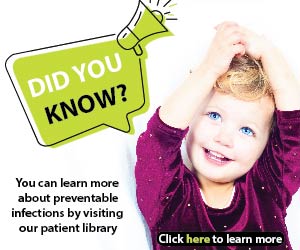How to survive the winter season with children in daycare

Popularized by fantasy TV series Game of Thrones, this quote brings relatable doom and gloom to Canadians everywhere: Winter is coming. However, parents and caregivers with daycare-aged children everywhere might be bracing themselves for worse: Winter viruses are coming. Having a sick child means dwindling childcare options when they can’t go to daycare, and interruptions to the parents’ or caregivers’ work schedule, all while expecting to get sick eventually, too.
Though having kids in daycare often feels like a revolving door of runny noses and warm foreheads, do not despair. Here are immunizations and hygienic practices for the most common cold weather viruses that could give you the peace you need when your loved ones aren’t feeling their best.
Common cold weather viruses
The common cold
Let’s begin with the virus that started it all: the common cold. These germs are typically spread by direct physical contact (like hugging caregivers or playmates), indirect contact (like playing with contaminated toys), or through the air (like living with a 3-year-old who has yet to grasp the concept of sneezing into their elbow).1
Your little ones may manifest symptoms like a sore throat, sneezing and coughing, loss of appetite, fatigue, and even a mild fever.2 The hard part comes into play when you try convincing your child that the only way to make it go away is to simply wait it out. Your best bet to beat the common cold is to err on the side of hygiene practices:
- Regular handwashing (of your own and your children’s hands), especially after coughing or blowing/wiping your/their nose.
- Keeping your distance from others who are sick, especially if there are babies under 3 months old at home.
- Sanitizing toys that are shared with multiple children.
- Communicating transparently with the daycare to see what their sickness policies are to avoid getting your (and other) children sick, and prepare for alternative care options of necessary.
The flu
Did you know young children between 6 months to 5 years of age are part of the group of people most at risk of the flu (known as the influenza virus) and its complications?3 This contagious respiratory condition spreads easily from person to person and can survive up to two days on contaminated surfaces or objects.
While flu symptoms may often present as the common cold, there are key differences that may require medical attention. Most of the symptoms on our common cold list (like sore throat, sneezing, coughing and loss of appetite) appear magnified, but those sick with the flu may also have a sudden, high fever, extreme fatigue, and all-over body aches.4 Similarly to the common cold, there isn’t much to do medically here than to rest, drink plenty of water, and if necessary, opt for over-the-counter fever and pain medications.
There are ways to prevent the severity of those symptoms, though. Children over 6 months old can receive their annual flu shot, and for free, to boot.5 In fact, their caregivers, people who are immunocompromised, and seniors over 60 years old generally qualify for free flu immunization, too. To see if your province or territory offers free universal vaccination, see the official Canadian immunization program page.6
Respiratory Syncytial Virus (RSV)
Respiratory syncytial virus, better known as its acronym, RSV, is the most common cause of lower respiratory tract infections among young children in the world.7 RSV outbreaks generally peak in the winter season, putting immense burden on the Canadian healthcare system.
This highly contagious virus infects the lungs and breathing tubes and spreads the same ways the common cold does.8 They also share similar symptoms, including coughing, sneezing, loss of appetite, and light fever. Since RSV is a virus, consider over-the-counter fever and pain meds, nasal rinses using saline solutions, and giving your child plenty of fluids. There is hope, however: recent developments in potential RSV vaccines have already shown promise during testing in older adults, so fingers crossed that more good news is on the horizon for the general population.9
The trials and tribulations of cold weather illnesses
Though the benefits may be hard to grasp right now, these trials will help boost your little ones’ immune system in the long run. As caregivers, think of ways you can unburden your future self and stay two steps ahead of potential illness by food prepping, thinking of alternatives for childcare if the kids aren’t allowed to attend daycare, and rolling out hygiene values at home. Make sure you and your children are up to date on your basic immunizations, book your yearly flu shot, and do your part in keeping your family safe!
Use our Vaccines411 clinic finder to see where you can book your flu vaccine today or talk to your doctor or health care provider to know where to begin.
Brought to you by Vaccines411.ca - know where to go for your vaccinations.
This information should not be used as a substitute for the medical care and advice of your doctor. There may be variations in treatment that your physician may recommend based on individual facts and circumstances.
Read more Vaccines411® Articles 
Sources
Note: the hyperlinks that direct to other sites are not continuously updated. It is possible that some links become untraceable over time. Thank you.
- Colds in children.
https://caringforkids.cps.ca/handouts/health-conditions-and-treatments/colds_in_children - Ibid.
- Flu (Influenza).
https://poumonquebec.ca/en/maladies/flu-influenza/?gclid=Cj0KCQiA1sucBhDgARIsAFoytUtsN9kMVLqhzUxJyrpACNKjxOe2nxDJnu_coxeayG5bX5XZl8jCNrYaAgglEALw_wcB - Ibid.
- Flu (influenza): Get your flu shot.
https://www.canada.ca/en/public-health/services/diseases/flu-influenza/get-your-flu-shot.html - Public Funding for Influenza Vaccination by Province/Territory (as of October 2022).
https://www.canada.ca/en/public-health/services/provincial-territorial-immunization-information/public-funding-influenza-vaccination-province-territory.html - Respiratory Syncytial Virus: Preparing for the 2022-23 season in the wake of COVID-19.
https://cps.ca/uploads/sections/NGR_-_Presentation_Slides_%28Jesse%29_-_Sep15.pptx_.pdf - RSV (Respiratory syncytial virus).
https://caringforkids.cps.ca/handouts/health-conditions-and-treatments/respiratory_syncytial_virus - Multiple RSV vaccines in late-stage development show promise in older adults.
https://www.healio.com/news/infectious-disease/20221020/multiple-rsv-vaccines-in-latestage-development-show-promise-in-older-adults#:~:text=Accessed%20Oct.-,19%2C%202022.,active%20immunization%20of%20pregnant%20women.



